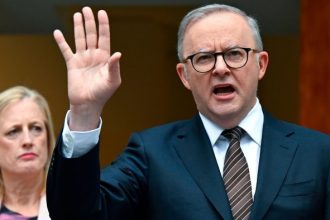Twelve months ago, delegates at the Munich Security Conference radiated optimism about the prospects for Ukraine, as the west vowed to back Kyiv in its war with Russia for “as long as it takes”. This year, with the conflict tilting in Moscow’s favour and faith in western support ebbing away, that optimism has flipped into unremitting gloom.
The three-day gathering in Munich that concluded on Sunday was marked by a recognition that Ukraine badly needed more weapons and ammunition, and that the rhetoric of solidarity must now be translated urgently into action.
“We don’t need any more words, we need decisions,” said Mette Frederiksen, prime minister of Denmark. “Ukraine can only win this war with weapons. Words are simply not enough.”
That was echoed by Dmytro Kuleba, Ukraine’s foreign minister. “I see the political will, but political will has to translate into action,” he said.
This year’s gathering of political leaders, diplomats, military brass and spy chiefs in the Bavarian capital — a conference nicknamed the Davos of defence — was dominated by the war in Ukraine amid fears that Russia is gaining the upper hand, as well as alarm at the increasingly dark turn Russia is taking.

On day one, attendees were shocked to learn of the death of Alexei Navalny, the Russian opposition leader sent to an Arctic Circle jail by Vladimir Putin’s regime.
“If you see what happened to Navalny, you can see the Russia that’s in front of us,” said Alexander de Croo, the Belgian prime minister.
The following day, it was announced that Ukrainian forces had withdrawn from the critical eastern city of Avdiivka, handing the Kremlin its first big battlefield win since its destruction and capture of Bakhmut last May.
But even before the conference opened, the outlook for Ukraine was deteriorating, as Republicans in Congress blocked a package of military aid to Kyiv, exacerbating a dire shortage of critical munitions that has hampered its ability to wage war.
Jens Stoltenberg, Nato general secretary, welcomed European efforts to fill the void left by the delaying of US aid, but warned that the “magnitude and the military capabilities” of the US meant it would be impossible for them to fully plug the gap.
The run-up to Munich was overshadowed by Donald Trump’s shocking remarks this month, when he said Russia could do “what the hell it wants” to Nato countries that failed to spend 2 per cent of their GDP on defence.
The intervention came with western leaders already worrying about what a possible second Trump presidency might mean for the future of the transatlantic alliance and western support for Ukraine.
“There is an elephant in the room in Munich and his name is Donald,” said Sigmar Gabriel, the former German foreign minister. “He must be laughing so much he can’t sleep.”
The mood this year contrasted starkly with the more upbeat 2023. “It was very self-congratulatory last year, with so much hope pinned on the Ukrainian counteroffensive,” said Heather Conley, head of the German Marshall Fund.
This year, prospects are darkening as Russia reconstitutes its army and has shifted to a war economy. “We’re going to see Ukraine suffer from battlefield losses, we could see significant Russian gains, and the Ukrainians have no ammunition left,” Conley said.
Admiral Rob Bauer, chair of the Nato military committee, acknowledged that the west had been “overly optimistic about the war in 2023”, believing that “if we give the Ukrainians the ammunition and training they need, they’ll win”.
Now, he added, “we have to be careful not to be overly pessimistic in 2024”. “The sheer fact that Ukraine is still a sovereign state, and that the Ukrainians have taken back 50 per cent of what the Russians took in 2022 is remarkable,” he said.
Speeches and public discussions in Munich were dominated by hand-wringing about how to fill Ukraine’s deficit in arms.
“Russia has learnt a lot of lessons [and] it’s also producing more ammunition and equipment than we collectively can provide,” said Petr Pavel, the Czech president and a former general. “We need to be as innovative and as flexible as Ukrainians on the ground and start looking for equipment everywhere.”
That message was echoed by JD Vance, a Republican US senator and Trump supporter, who said that “the problem is that America doesn’t produce enough weapons, Europe doesn’t make enough weapons, and that’s far more important than US political will or how much money we print and send to Europe”.
Some leaders’ speeches were marked by an undercurrent of rancour — a feeling that their countries were bending over backwards for Ukraine while others in Europe were not pulling their weight.
“The sense of urgency is not there,” said Frederiksen. “Denmark has donated its entire artillery stock, but there’s still ammunition in stock in Europe” that could be sent to Ukraine.
That was also the message of Grant Shapps, UK defence secretary, who said “we need all countries to step up”, and of Olaf Scholz, the German chancellor.
Germany had provided €28bn in aid to Ukraine, with a further €7bn in the pipeline this year. “I wish . . . similar decisions could be taken in other European capitals,” he said.

Scholz added that the US had provided Ukraine with more than $20bn of military aid a year, compared to its GDP of $28tn. “A comparable effort should be the minimum that every European country undertakes,” he said.
Germany is indeed the second-largest supplier of aid to Ukraine after the US. But Scholz, too, has been the target of criticism, for refusing to send Taurus cruise missiles to Ukraine — a weapon system some people say could be a game-changer in the war.
Michael McFaul, director of the Freeman Spogli Institute for International Studies at Stanford University and a former US ambassador to Moscow, said there was a “real sense of frustration” among his Ukrainian friends.
“We keep hearing ‘as long as it takes’,” he said. “But where is the action? Where are the Taurus missiles? Where are Russia’s frozen assets? Why aren’t they being transferred to Ukraine?”
“The free world says the right thing, but we’re not living up to the moment,” he said. “And the moment is dire.”
Read the full article here




